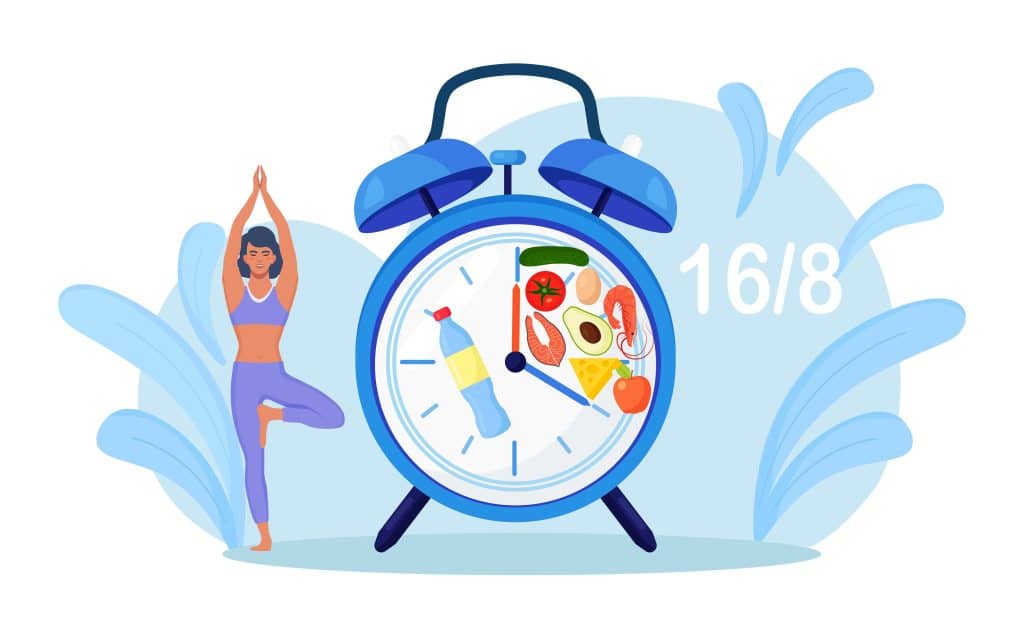Health Benefits Of Time Restricted Feeding – A Detailed Look At Intermittent Fasting
The health benefits of Time Restricted Feeding are extensive and can help you achieve your health goals. Intermittent fasting, also known as time-restricted feeding, is a popular eating pattern that involves alternating periods of fasting and eating.
Intermittent fasting is not a diet plan, but rather an eating pattern. It involves cycling between periods of eating and fasting. This can be done in different ways, such as the 16/8 method (fasting for 16 hours and eating within an 8 hour window) or alternate day fasting (alternating between days of eating normally and fasting). The most common approach is the 16/8 method, which can be easily incorporated into daily routines.
Health Benefits Of Time Restricted Feeding – Improved Metabolic Health
One of the main benefits of Time Restricted Feeding is improved metabolic health. Studies have shown that this eating pattern can increase insulin sensitivity, leading to better blood sugar control.1 It has also been found to lower levels of inflammation in the body, which is linked to a variety of health problems.2
Time Restricted Feeding Prevents Metabolic Diseases
The concept behind Time Restricted Feeding is based on our natural circadian rhythm, which regulates various physiological processes, including metabolism. Our bodies have evolved to function optimally when we eat during the day and fast at night.3 Intermittent fasting has been shown to improve many markers of metabolic health, such as blood pressure and cholesterol levels.4
Studies have also shown that Time Restricted Feeding can help prevent and even reverse various metabolic diseases. For example, a study found that restricting feeding to a 12-hour window not only prevented obesity but also reversed it.5
An 8 Hour Feeding Window Reduces Obesity And Reverses Metabolic Diseases
Several studies have shown that an 8 hour feeding window can have significant effects on weight loss and the reversal of metabolic diseases. One of these studies found that individuals who followed this type of intermittent fasting for 12 weeks saw a decrease in body weight, body fat percentage, and waist circumference.6
Another study compared the effects of a traditional calorie-restricted diet versus an 8-hour time-restricted feeding window. The results showed that both groups lost a similar amount of weight, but the individuals in the 8-hour group experienced a decrease in body fat mass while maintaining lean muscle mass.7
Another study found that an 8-hour time-restricted feeding window led to significant improvements in insulin sensitivity and blood sugar control.8

Increase In Blood Glucose Is A Predictor Of Mortality
High blood glucose levels, or hyperglycemia, is a common health condition affecting millions of people worldwide. It occurs when the body has too much sugar in the blood and cannot use it effectively. If left untreated, high blood glucose levels can lead to serious complications such as heart disease, stroke, nerve damage, and even death.
Recent studies have shown a strong link between high blood glucose levels and mortality rates. In fact, an increase in blood glucose levels has been identified as a significant predictor of mortality in both diabetic and non-diabetic individuals.9
Health Benefits Of Intermittent Fasting – Weight Loss
Intermittent fasting has gained popularity as a weight loss tool. By restricting the time window for eating, it can help reduce caloric intake and promote fat burning. It has also been shown to increase levels of human growth hormone, which aids in fat loss and muscle gain.10
Read more about losing weight.
Fast At Least 1 Hour After Waking Up And 3 Hours Before Bedtime
Waking up in the morning triggers certain hormones and enzymes that prepare our bodies to start digesting food. By fasting for at least an hour after waking up, we allow these hormones and enzymes to fully kick in and do their job before introducing new food. This can lead to better digestion, increased energy, and improved overall health.11
On the other hand, fasting for at least 3 hours before bedtime allows our bodies to properly digest and process the food we’ve consumed throughout the day. Going to bed on a full stomach can disrupt sleep and lead to weight gain. By giving our bodies a break from digesting food before bedtime, we can promote better sleep and prevent weight gain.12
With this knowledge, you can determine the ideal 8 hour Time Restricted Feeding cycle for you. For most people, eating between 10 am and 6 pm is the ideal feeding window.

Time Restricted Feeding Reverses Fatty Liver Disease
The term “fatty liver disease” refers to a condition in which there is an accumulation of excess fat in the liver. This can lead to inflammation and damage of liver cells, potentially leading to more serious conditions such as cirrhosis and liver failure. Fatty liver disease is commonly associated with obesity and other metabolic disorders, and it has become increasingly prevalent in recent years due to the rise in obesity rates.13
One potential treatment for fatty liver disease is Time Restricted Feeding. Recent studies have shown that Time Restricted Feeding can effectively reverse fatty liver disease in both animal models and human subjects. One study found that mice with diet-induced fatty liver disease who were put on a Time Restricted Feeding regimen for 26 weeks showed significant improvements in liver health, including reduced fat accumulation and inflammation.14
Another study conducted on humans with non-alcoholic fatty liver disease (NAFLD) also showed promising results. Participants who practiced Time Restricted Feeding for 12 months saw a reduction in liver fat, as well as improvements in insulin sensitivity and cholesterol levels.15
Read more about non-alcoholic fatty liver disease.
Time Restricted Feeding Reduces Inflammation
Research has shown that Time Restricted Feeding has anti-inflammatory effects. Inflammation is a natural response of the immune system to protect the body from injury and infection. However, chronic inflammation can contribute to various health issues, including heart disease.16
Studies have found that Time Restricted Feeding can reduce inflammation in the body by altering gene expression and modulating immune responses. A study on overweight individuals found that following a Time Restricted Feeding pattern reduced markers of inflammation in the blood.17
Read more about the dangers of inflammation.
Time Restricted Feeding Increases Brown Fat Stores
One interesting aspect of Time Restricted Feeding is its effect on brown adipose tissue (BAT), a specialized type of fat that generates heat and helps regulate body temperature. In recent years, BAT has been recognized as an important player in metabolic health and energy balance.
Research has shown that Time Restricted Feeding can increase the amount of BAT in the body. A study found that following Time Restricted Feeding significantly increased levels of BAT compared to the same diet eaten freely throughout the day.18
Time Restricted Feeding Improves Autophagy
Studies have shown that Time Restricted Feeding can increase autophagy in various tissues, including the liver, brain, and muscles. This is due to the fact that during periods of fasting, the body shifts into a state of ketosis, where it primarily uses fat for energy instead of glucose. This metabolic shift triggers autophagy as a means to provide the body with the necessary energy and nutrients.21
Furthermore, Time Restricted Feeding has also been shown to increase levels of a protein called sirtuin 1 (SIRT1), which is known to activate autophagy. SIRT1 is also responsible for other health benefits, such as improving insulin sensitivity and reducing inflammation.22

Health Benefits Of Intermittent Fasting – Improved Brain Function
Intermittent fasting has also been linked to improved brain health. Studies have shown that this eating pattern can increase levels of a protein called brain-derived neurotrophic factor (BDNF), which promotes the growth of new neurons in the brain. This can improve cognitive function and protect against age-related cognitive decline.23
Health Benefits Of Intermittent Fasting – Anti-Aging Benefits
One of the most intriguing benefits of intermittent fasting is its potential to increase lifespan. Animal studies have shown that this eating pattern can extend lifespan and delay age-related diseases. While more research is needed in humans, there are promising results that suggest intermittent fasting may have anti-aging effects.24
A 20 Minute Walk After Dinner Improves Glucose Clearing Time
After dinner, most people usually relax and watch TV or go straight to bed. However, taking a 20-minute walk after dinner can have numerous health benefits. Apart from helping with digestion, studies have shown that walking after a meal can improve glucose clearing in the body. Moreover, regular post-meal walks have been shown to increase fasting time. By walking after dinner, you can increase your fasting time by up to 3 hours.25 26
Health Benefits Of Intermittent Fasting – A Detailed Look At Time Restricted Feeding
The health benefits of Time Restricted Feeding are far reaching, providing an effective way to improve your overall health. If you are looking for improved metabolic health, weight loss, brain health, and longevity consider intermittent fasting.
Read more about the health benefits of fasting.
References
1 Che T, Yan C, Tian D, Zhang X, Liu X, Wu Z. Time-restricted feeding improves blood glucose and insulin sensitivity in overweight patients with type 2 diabetes: a randomised controlled trial. Nutr Metab (Lond). 2021 Oct 7;18(1):88. doi: 10.1186/s12986-021-00613-9. PMID: 34620199; PMCID: PMC8499480.
2 Moro T, Tinsley G, Bianco A, Marcolin G, Pacelli QF, Battaglia G, Palma A, Gentil P, Neri M, Paoli A. Effects of eight weeks of time-restricted feeding (16/8) on basal metabolism, maximal strength, body composition, inflammation, and cardiovascular risk factors in resistance-trained males. J Transl Med. 2016 Oct 13;14(1):290. doi: 10.1186/s12967-016-1044-0. PMID: 27737674; PMCID: PMC5064803.
3 Manoogian ENC, Panda S. Circadian rhythms, time-restricted feeding, and healthy aging. Ageing Res Rev. 2017 Oct;39:59-67. doi: 10.1016/j.arr.2016.12.006. Epub 2016 Dec 23. PMID: 28017879; PMCID: PMC5814245.
4 Gabel K, Cienfuegos S, Kalam F, Ezpeleta M, Varady KA. Time-Restricted Eating to Improve Cardiovascular Health. Curr Atheroscler Rep. 2021 Mar 26;23(5):22. doi: 10.1007/s11883-021-00922-7. PMID: 33772388; PMCID: PMC8218778.
5 Jamshed H, Steger FL, Bryan DR, Richman JS, Warriner AH, Hanick CJ, Martin CK, Salvy SJ, Peterson CM. Effectiveness of Early Time-Restricted Eating for Weight Loss, Fat Loss, and Cardiometabolic Health in Adults With Obesity: A Randomized Clinical Trial. JAMA Intern Med. 2022 Sep 1;182(9):953-962. doi: 10.1001/jamainternmed.2022.3050. PMID: 35939311; PMCID: PMC9361187.
6 Gabel K, Hoddy KK, Haggerty N, Song J, Kroeger CM, Trepanowski JF, Panda S, Varady KA. Effects of 8-hour time restricted feeding on body weight and metabolic disease risk factors in obese adults: A pilot study. Nutr Healthy Aging. 2018 Jun 15;4(4):345-353. doi: 10.3233/NHA-170036. PMID: 29951594; PMCID: PMC6004924.
7 Moro T, Tinsley G, Bianco A, Marcolin G, Pacelli QF, Battaglia G, Palma A, Gentil P, Neri M, Paoli A. Effects of eight weeks of time-restricted feeding (16/8) on basal metabolism, maximal strength, body composition, inflammation, and cardiovascular risk factors in resistance-trained males. J Transl Med. 2016 Oct 13;14(1):290. doi: 10.1186/s12967-016-1044-0. PMID: 27737674; PMCID: PMC5064803.
8 Cienfuegos S, McStay M, Gabel K, Varady KA. Time restricted eating for the prevention of type 2 diabetes. J Physiol. 2022 Mar;600(5):1253-1264. doi: 10.1113/JP281101. Epub 2021 Sep 8. PMID: 34418079.
9 Kesavadev J, Misra A, Saboo B, Aravind SR, Hussain A, Czupryniak L, Raz I. Blood glucose levels should be considered as a new vital sign indicative of prognosis during hospitalization. Diabetes Metab Syndr. 2021 Jan-Feb;15(1):221-227. doi: 10.1016/j.dsx.2020.12.032. Epub 2021 Jan 2. PMID: 33450531; PMCID: PMC8049470.
10 Kim BH, Joo Y, Kim MS, Choe HK, Tong Q, Kwon O. Effects of Intermittent Fasting on the Circulating Levels and Circadian Rhythms of Hormones. Endocrinol Metab (Seoul). 2021 Aug;36(4):745-756. doi: 10.3803/EnM.2021.405. Epub 2021 Aug 27. PMID: 34474513; PMCID: PMC8419605.
11 Xiao Q, Bauer C, Layne T, Playdon M. The association between overnight fasting and body mass index in older adults: the interaction between duration and timing. Int J Obes (Lond). 2021 Mar;45(3):555-564. doi: 10.1038/s41366-020-00715-z. Epub 2020 Nov 19. PMID: 33214704; PMCID: PMC9116132.
12 Almeneessier AS, BaHammam AS. How does diurnal intermittent fasting impact sleep, daytime sleepiness, and markers of the biological clock? Current insights. Nat Sci Sleep. 2018 Dec 7;10:439-452. doi: 10.2147/NSS.S165637. PMID: 30573998; PMCID: PMC6292409.
13 Antunes C, Azadfard M, Hoilat GJ, et al. Fatty Liver. [Updated 2023 Jan 1]. In: StatPearls [Internet]. Treasure Island (FL): StatPearls Publishing; 2023 Jan-. Available from: https://www.ncbi.nlm.nih.gov/books/NBK441992/
14 Wilson RB, Zhang R, Chen YJ, Peters KM, Sawyez CG, Sutherland BG, Patel K, Kennelly JP, Leonard KA, Jacobs RL, Wang R, Borradaile NM. Two-Week Isocaloric Time-Restricted Feeding Decreases Liver Inflammation without Significant Weight Loss in Obese Mice with Non-Alcoholic Fatty Liver Disease. Int J Mol Sci. 2020 Dec 1;21(23):9156. doi: 10.3390/ijms21239156. PMID: 33271781; PMCID: PMC7730100.
15 Wei X, Lin B, Huang Y, Yang S, Huang C, Shi L, Liu D, Zhang P, Lin J, Xu B, Guo D, Li C, He H, Liu S, Xue Y, Xu Y, Zhang H. Effects of Time-Restricted Eating on Nonalcoholic Fatty Liver Disease: The TREATY-FLD Randomized Clinical Trial. JAMA Netw Open. 2023 Mar 1;6(3):e233513. doi: 10.1001/jamanetworkopen.2023.3513. PMID: 36930148; PMCID: PMC10024204.
16 Pahwa R, Goyal A, Jialal I. Chronic Inflammation. [Updated 2023 Aug 7]. In: StatPearls [Internet]. Treasure Island (FL): StatPearls Publishing; 2023 Jan-. Available from: https://www.ncbi.nlm.nih.gov/books/NBK493173/
17 Soliman GA. Intermittent fasting and time-restricted eating role in dietary interventions and precision nutrition. Front Public Health. 2022 Oct 28;10:1017254. doi: 10.3389/fpubh.2022.1017254. PMID: 36388372; PMCID: PMC9650338.
18 Bushman T, Lin TY, Chen X. Depot-Dependent Impact of Time-Restricted Feeding on Adipose Tissue Metabolism in High Fat Diet-Induced Obese Male Mice. Nutrients. 2023 Jan 3;15(1):238. doi: 10.3390/nu15010238. PMID: 36615895; PMCID: PMC9823673.
20 Yun CW, Lee SH. The Roles of Autophagy in Cancer. Int J Mol Sci. 2018 Nov 5;19(11):3466. doi: 10.3390/ijms19113466. PMID: 30400561; PMCID: PMC6274804.
21 Yin Z, Klionsky DJ. Intermittent time-restricted feeding promotes longevity through circadian autophagy. Autophagy. 2022 Mar;18(3):471-472. doi: 10.1080/15548627.2022.2039524. Epub 2022 Feb 27. PMID: 35220894; PMCID: PMC9037462.
22 Jiao F, Gong Z. The Beneficial Roles of SIRT1 in Neuroinflammation-Related Diseases. Oxid Med Cell Longev. 2020 Sep 14;2020:6782872. doi: 10.1155/2020/6782872. PMID: 33014276; PMCID: PMC7519200.
23 Irani H, Khodami B, Abiri B, Saidpour A. Effect of time restricted feeding on anthropometric measures, eating behavior, stress, and brain-derived neurotrophic factor (BDNF) and lipopolysaccharide-binding protein (LBP) levels in women with overweight/obesity and food addiction: a study protocol for a randomized clinical trial. Trials. 2022 Jun 10;23(1):482. doi: 10.1186/s13063-022-06439-x. PMID: 35689257; PMCID: PMC9188095.
24 Lee MB, Hill CM, Bitto A, Kaeberlein M. Antiaging diets: Separating fact from fiction. Science. 2021 Nov 19;374(6570):eabe7365. doi: 10.1126/science.abe7365. Epub 2021 Nov 19. PMID: 34793210; PMCID: PMC8841109.
25 Colberg SR, Zarrabi L, Bennington L, Nakave A, Thomas Somma C, Swain DP, Sechrist SR. Postprandial walking is better for lowering the glycemic effect of dinner than pre-dinner exercise in type 2 diabetic individuals. J Am Med Dir Assoc. 2009 Jul;10(6):394-7. doi: 10.1016/j.jamda.2009.03.015. Epub 2009 May 21. PMID: 19560716.
26 Engeroff T, Groneberg DA, Wilke J. After Dinner Rest a While, After Supper Walk a Mile? A Systematic Review with Meta-analysis on the Acute Postprandial Glycemic Response to Exercise Before and After Meal Ingestion in Healthy Subjects and Patients with Impaired Glucose Tolerance. Sports Med. 2023 Apr;53(4):849-869. doi: 10.1007/s40279-022-01808-7. Epub 2023 Jan 30. PMID: 36715875; PMCID: PMC10036272.




